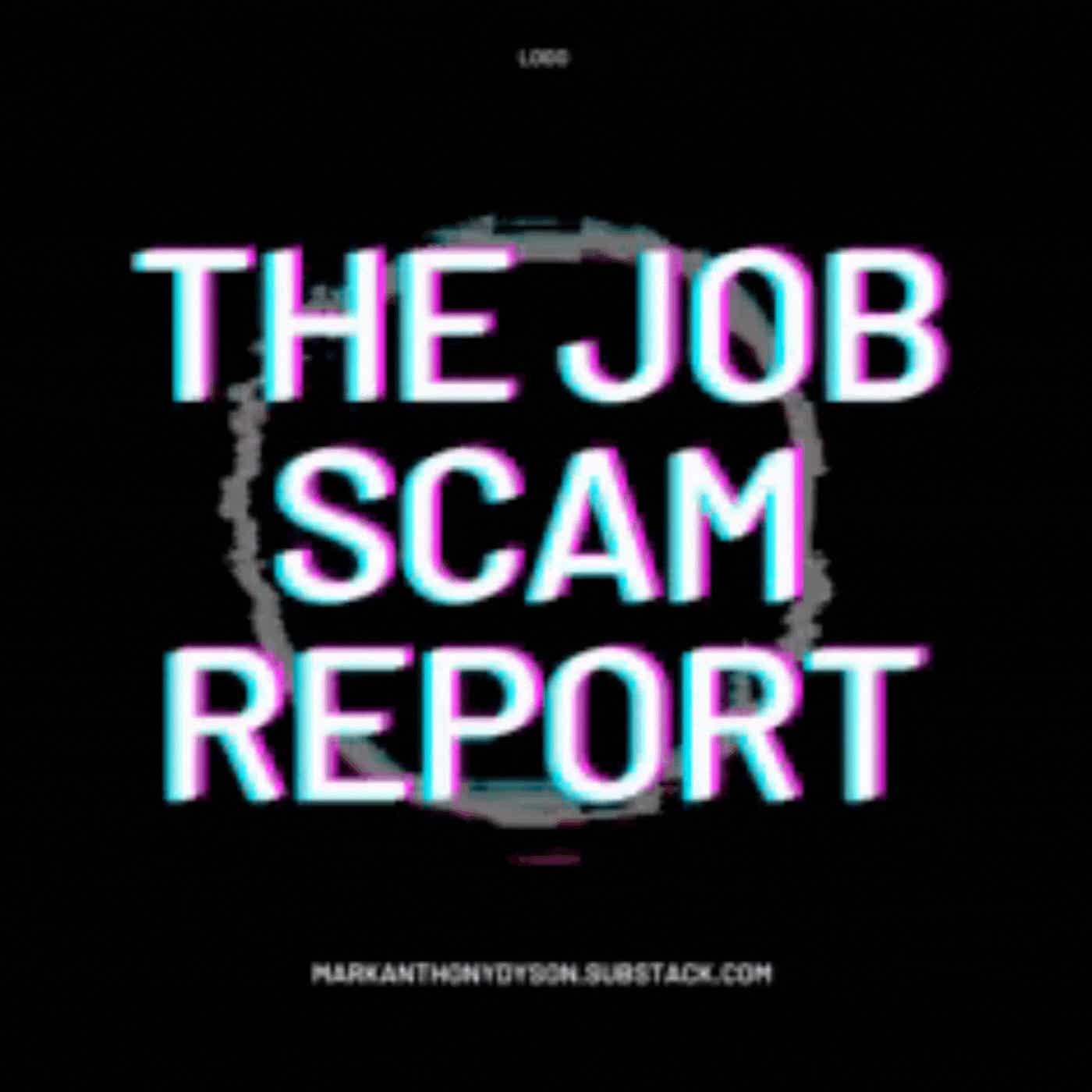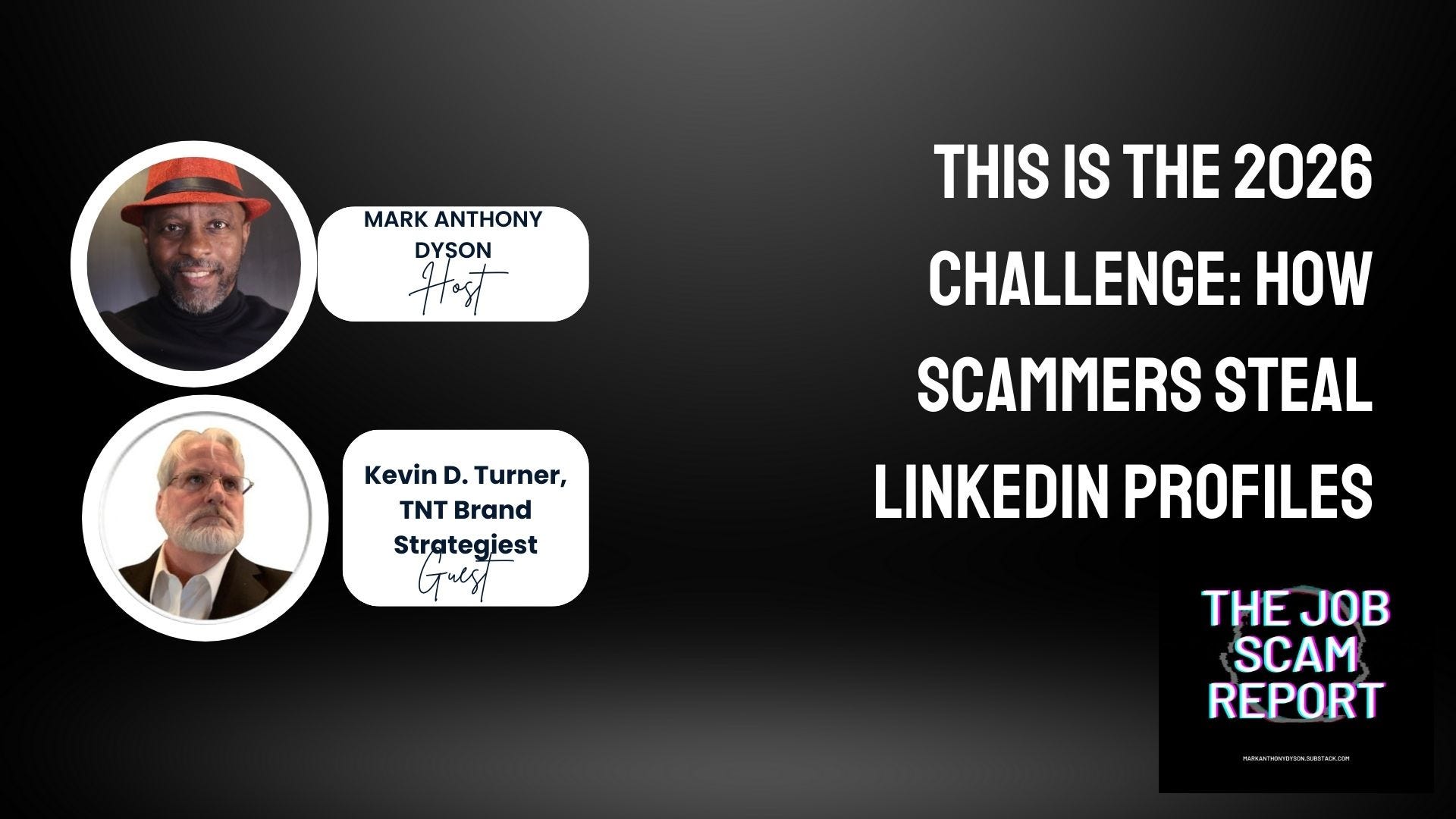The Job Scam Report Podcast

The Job Scam Report Podcast
Podcast Description
The podcast, “The Job Scam Report,” can only be found here on my Substack and YouTube.
I created "The Job Scam Report" on Substack in May 2024. I started the podcast shortly after realizing its potential to reach many more job seekers trying to conduct a job search without being lured by bad actors. Job scams are a pandemic in the marketplace. The sooner the signs of a scam are recognized, the quicker one must disengage from communication with them.
It should take just one sign to stop, block, and report them. Inform your network and report if you have engaged with a link, PDF, or downloaded a communication from them.
Subscribe to my Substack: markanthonydyson.substack.com.
Contact me with inquiries: markanthonydyson{at}substack{dot}com.
Along the way, I added April Price-Horton and Jay Jones as regular co-hosts. We've created memorable and informative shows that have been watched by hundreds of participants on LinkedIn Live.
Ashley Price-Horton:
YouTube: @cybercareeradvancement
LinkedIn: https://www.linkedin.com/in/apricehorton/
Jay Jones:
https://www.linkedin.com/in/jonesdoyoucopy/
We have also been featured in prominent mainstream media outlets, including Forbes, Fast Company, Yahoo Finance, MSN, The Business Journals, and others. markanthonydyson.substack.com
Podcast Insights
Content Themes
The podcast covers themes related to job scam awareness, safe job search practices, and the psychological impact of scams, with specific episodes discussing signs of job scams, strategies to combat them, and the effects of AI on the job search process.

The podcast, “The Job Scam Report,” can only be found here on my Substack and YouTube.
I created “The Job Scam Report” on Substack in May 2024. I started the podcast shortly after realizing its potential to reach many more job seekers trying to conduct a job search without being lured by bad actors. Job scams are a pandemic in the marketplace. The sooner the signs of a scam are recognized, the quicker one must disengage from communication with them.
It should take just one sign to stop, block, and report them. Inform your network and report if you have engaged with a link, PDF, or downloaded a communication from them.
Subscribe to my Substack: markanthonydyson.substack.com.
Contact me with inquiries: markanthonydyson{at}substack{dot}com.
Along the way, I added April Price-Horton, Jay Jones, and Russell Irby as regular co-hosts. We’ve created memorable and informative shows that have been watched by hundreds of participants on LinkedIn Live.
Ashley Price-Horton:
YouTube: @cybercareeradvancement
LinkedIn: https://www.linkedin.com/in/apricehorton/
Jay Jones:
https://www.linkedin.com/in/jonesdoyoucopy/
We have also been featured in prominent mainstream media outlets, including Forbes, Fast Company, Yahoo Finance, MSN, The Business Journals, and others.
Kevin Turner, a well-known Brand Strategist and LinkedIn expert, offered a post-show perspective on job scams on LinkedIn. He says a stolen LinkedIn profile could be leveraged on other platforms, such as Facebook and Fiverr, to sell fake services.
He says bad actors will use the credibility through endorsements and references on LinkedIn to build false trust for scams on other platforms.
Kevin mentions an article he wrote on LinkedIn about ‘fake recruiters on LinkedIn sending, DMS messaging to individuals on LinkedIn and saying, Hey, I’ve got an incredible opportunity.
You look like a perfect match. And when somebody would look at it, they’d go and they’d say, just click on the link and look at it, read it, and if you’re interested. Get back into the DMs.
What they did when they clicked that link was relinquish through that process.”
Enjoy the show.
Need help keeping your private information safe?
I wanted to ensure that the companies I partner with for ‘The Job Scam Report’ were a good fit. The FBI reports Americans are losing significantly more to cybercrime than home burglaries, with digital crime financial losses reaching approximately $12.5 billion in 2023 alone.
Job search strategy and safety should be top of mind for all job seekers.
I’m happy to announce that Aura’s All-in-One Online Safety is an affiliate of “The Job Scam Report.” It’s powered by AI to proactively help protect your identity, finances, and devices. With $1M Identity Theft Insurance and 24/7, U.S.-based expert support, you can job search with little worry of protecting your computer and personal information.
This is a public episode. If you’d like to discuss this with other subscribers or get access to bonus episodes, visit markanthonydyson.substack.com/subscribe

Disclaimer
This podcast’s information is provided for general reference and was obtained from publicly accessible sources. The Podcast Collaborative neither produces nor verifies the content, accuracy, or suitability of this podcast. Views and opinions belong solely to the podcast creators and guests.
For a complete disclaimer, please see our Full Disclaimer on the archive page. The Podcast Collaborative bears no responsibility for the podcast’s themes, language, or overall content. Listener discretion is advised. Read our Terms of Use and Privacy Policy for more details.